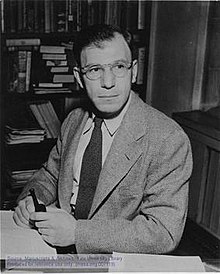Bernard Brodie (military strategist)
| Bernard Brodie | |
|---|---|

Bernard Brodie sitting at his desk.
|
|
| Born | May 20, 1910 Chicago, Illinois USA |
| Died | November 24, 1978 (aged 68) California, USA |
| Alma mater | University of Chicago (Ph.B, 1932)(Ph.D, 1940) |
| Occupation | |
| Known for | The Diffusion of Nuclear Weapons to Additional Countries: The "Nth Country" Problem, (1960) |
Bernard Brodie (May 20, 1910 – November 24, 1978) was an American military strategist well known for establishing the basics of nuclear strategy. Known as "the American Clausewitz," and "the original nuclear strategist," he was an initial architect of nuclear deterrence strategy and tried to ascertain the role and value of nuclear weapons after their creation.
Brodie was initially a strong supporter of the concept of escalating responses; he promoted the view that a war in Europe would be started with conventional forces and escalate to nuclear only if and when necessary. After a meeting with French counterparts in 1960 he came to espouse a very different policy, one based purely on nuclear deterrence with the stated position that the US would use nuclear arms at the first instance of hostilities of any sort. He felt that anything short of this seriously eroded the concept of deterrence and might lead to situations where one side might enter hostilities believing it could remain non-nuclear. This change in policy made Brodie increasingly at odds with his contemporaries.
Born in Chicago, Bernard Brodie was the third of four sons of Max and Esther (Bloch) Brodie, Jewish immigrants from the Russian Empire. His father was a fruit pedlar and Yiddish was the language of the household. Brodie graduated from the University of Chicago with a Ph.B in 1932, and received a Ph.D in 1940 under Jacob Viner.
Brodie was an instructor at Dartmouth College from 1941 to '43. During World War II, he served in the U.S. Naval Reserve Bureau of Ordnance and at the Office of the Chief of Naval Operations. He then taught at Yale University from 1945 to 1951, where he was a member of the Yale Institute of International Studies, and worked at the RAND Corporation as a senior staff member between 1951 and 1966. Brodie was a full professor and taught Political Science and International Relations at UCLA from 1966 until his death in 1978.
...
Wikipedia
